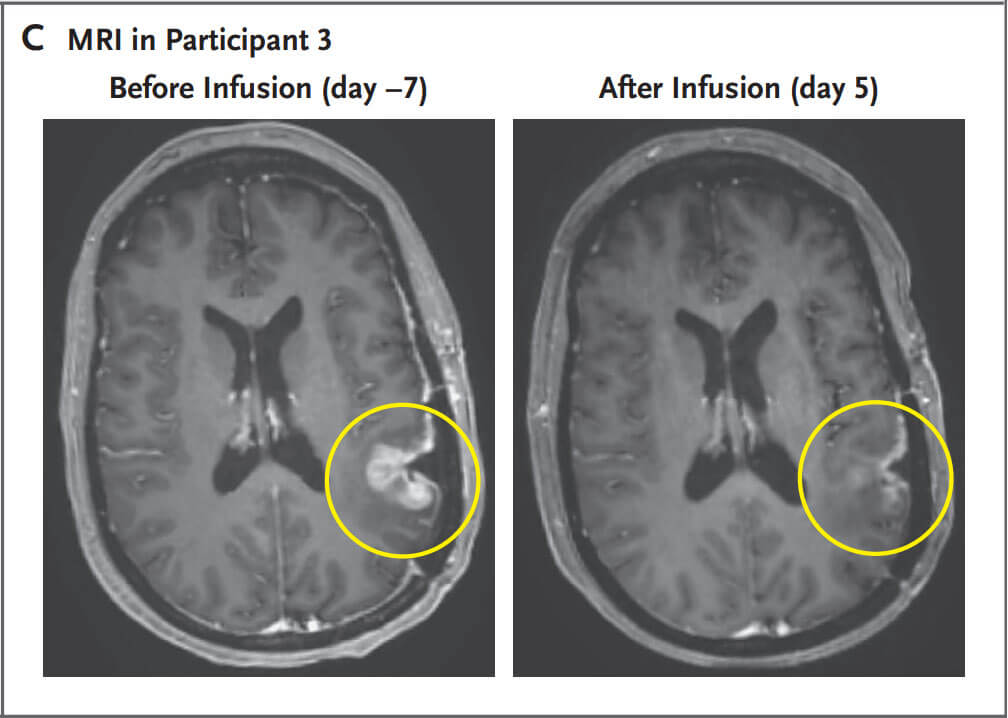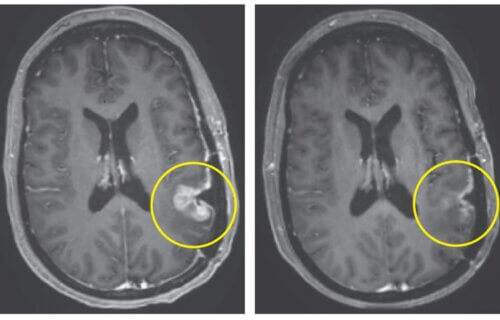BOSTON — A new treatment for deadly brain tumors is delivering remarkably quick and significant results, nearly eradicating the cancer within just five days. Scientists at Mass General Brigham are describing this breakthrough treatment as “dramatic and rapid.”
Researchers at the Mass General Cancer Center are reporting on the outcomes of the first three patients in a clinical trial of CAR-T therapy for glioblastoma (GBM), a rapidly growing brain tumor and the most common type of malignant brain tumor in adults.
CAR-T therapy, which represents the most personalized form of cancer treatment, operates by leveraging a patient’s own cells to combat the disease. This involves extracting a patient’s cells, engineering them to express specific proteins on their surface, and then reintroducing them into the body to directly target the tumor.
The trial, dubbed INCIPIENT, aimed to assess the safety of CARv3-TEAM-E T cells in patients with recurrent GBM. While CAR-T therapies have gained approval for treating blood cancers, their application in solid tumors has been limited due to the diverse cell populations within these tumors, which allow some cancer cells to evade immune detection even after CAR-T treatment.
To address this challenge, the research team employed a novel strategy combining CAR-T with bispecific antibodies, or T-cell engaging antibody molecules (TEAMs). This combined approach, specifically designed for glioblastoma, involves direct injection into the patient’s brain.
The strategy showed promise in preclinical models of glioblastoma, motivating the researchers to move towards clinical application.
Between March 2023 and July 2023, three patients were enrolled in the study, which is published in the New England Journal of Medicine. Their T cells were collected, modified into the new CAR-TEAM cells, and then infused back into each patient.
Although nearly all participants experienced fevers and changes in mental status shortly after the infusion, they generally tolerated the procedure well. Remarkably, just days after a single treatment, the patients saw significant reductions in their tumors, with one patient achieving nearly complete tumor regression within five days.

“This is a story of bench-to-bedside therapy, with a novel cell therapy designed in the laboratories of Massachusetts General Hospital and translated for patient use within five years, to meet an urgent need,” says Bryan Choi, MD, PhD, a neurosurgeon and associate director of the Center for Brain Tumor Immunology and Immunotherapy, Cellular Immunotherapy Program, Mass General Cancer Center and Department of Neurosurgery, in a media release.
“The CAR-T platform has revolutionized how we think about treating patients with cancer, but solid tumors like glioblastoma have remained challenging to treat because not all cancer cells are exactly alike and cells within the tumor vary. Our approach combines two forms of therapy, allowing us to treat glioblastoma in a broader, potentially more effective way.”
One of the patients, a 72-year-old man, saw an over 60-percent decrease in his tumor which was sustained for six months, while a 57-year-old woman had near complete tumor regression only five days after a single infusion.
The team say that their results are exciting, but that much more research is needed to fine tune this treatment.
“We’ve made an investment in developing the team to enable translation of our innovations in immunotherapy from our lab to the clinic, to transform care for patients with cancer,” adds Associate Professor Marcela Maus, director of the Cellular Immunotherapy Program at the Mass General Cancer Center. “These results are exciting, but they are also just the beginning—they tell us that we are on the right track in pursuing a therapy that has the potential to change the outlook for this intractable disease. We haven’t cured patients yet, but that is our audacious goal.”
“We report a dramatic and rapid response in these three patients. Our work to date shows signs that we are making progress, but there is more to do,” concludes co-author Elizabeth Gerstner, MD, a neuro-oncologist in the Department of Neurology at Massachusetts General Hospital.

extremely interesting website!